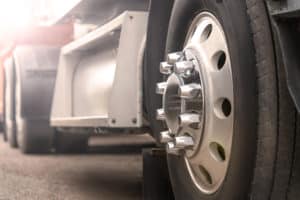Truck accidents often cause catastrophic injuries and death, simply because of the size and weight of the truck involved. According to the Centers for Disease Control (CDC), one in three over-the-road truck drivers were in a serious wreck at some point in their careers. While the number of deaths was around 700 per year in 2015, that number increased by 26 percent in 2017. While statistics concentrate on the total number of accidents due to speeding or driving under the influence, mechanical failure does play a part in some accidents.
Truck Inspections
The federal regulations require motor carriers to inspect, maintain and repair the trucks in their fleets. Inspections must cover any truck part that affects the safety of the truck or those involved in its operation, including but not limited to the truck’s suspension, tires, frame, wheels, and steering systems. Motor carriers must also keep maintenance and repair records for up to a year. The records must include the truck’s identification number, the date, and the type of repairs performed.
Types of Mechanical Failure
Several types of mechanical failures could cause a driver to lose control of his truck. If the truck is a big rig instead of a single unit, the crash is usually worse since the big rig has a trailer that also goes out of control.
Tires
 If the amount of rubber littering the shoulders of Nevada highways is any indication, tire failure is one of the more common mechanical failures experienced by large trucks. Many trucks have recapped tires on the rear—recaps are not allowed on the steering tires. The heat from the friction of the tire rolling on hot pavement often causes the glued-on tread to separate from the rest of the tire. Tires can also blow out because of a puncture from debris in the road. Slick tires do not get traction and could cause a truck to slide out of control on wet or snowy roads.
If the amount of rubber littering the shoulders of Nevada highways is any indication, tire failure is one of the more common mechanical failures experienced by large trucks. Many trucks have recapped tires on the rear—recaps are not allowed on the steering tires. The heat from the friction of the tire rolling on hot pavement often causes the glued-on tread to separate from the rest of the tire. Tires can also blow out because of a puncture from debris in the road. Slick tires do not get traction and could cause a truck to slide out of control on wet or snowy roads.
Incorrect tire pressure could also cause blowouts and problems with braking. Motor carriers and drivers should inspect all tires on the truck and trailer before every trip. Once a tire gets below the required minimum tread or if it shows signs of separating, truck companies should replace them.
Brakes
The brakes on a truck wear out quickly because of the weight they are required to stop. Additionally, if something goes wrong with a truck’s air system, the air brakes could lock up or not work at all. Most trucks also have a Jake Brake, which is built by Jacobs Engineering. The Jake Brake changes the exhaust valve timing in the engine, which turns the engine from a power plant into an air compressor. The Jake Brake saves wear and tear on the service brakes, but does not stop the truck—it only slows the truck down when going downhill and gives the driver more control over the truck.
If the Jake Brake isn’t working properly, the driver could hit the service brakes too hard and cause the truck to slide out of control. Although the Jake Brake is only used to slow the truck down, it could cause an accident if it malfunctions.
Lights
A truck has many lights—headlights, turn signals, taillights, brake lights, and running lights. The lights are imperative to the safety of the truck driver and other drivers on the road. The running lights show other drivers how big a truck is at night. If the truck is driving down a very dark highway with no other lighting, the running lights on the truck and trailer show other drivers the length and height of the truck. Checking all of the truck’s lights is part of the inspection before the truck goes on the road.
Suspension and Steering
If any of the steering or suspension components fail, the driver could lose control of the truck. While some parts may make the truck difficult to control, other broken or defective parts could cause a wreck as soon as they break. For example, a broken power steering pump might make the truck more difficult to steer, but a broken tire rod end could cause a serious wreck.
Wipers
The wipers are an essential part of any truck that not many people think about, especially after many days of great weather. Wipers could wear out and not clear the windshield enough for a driver to see. The wiper pump could malfunction, which could cause the wipers not to work at all. If the park function on the wiper motor breaks, the wipers could stop in the middle of the windshield and obstruct the driver’s view.
Coupling
Trucks with trailers use a coupling hitch to attach the truck and trailer. Additionally, several air lines and wires connect the two pieces of the vehicle. If the hitch malfunctions, a truck could lose the trailer. If the electrical wires break, the trailer might not have lights. If the air lines break, the air brakes won’t work on the trailer. If the trailer brakes do not work, the truck will take much longer to slow down or the trailer brakes could lock up, sending the trailer and the truck out of control.
Transmission
The transmission sends power from the engine to the rear wheels of the truck. If the transmission is low on fluid or malfunctions, the truck could free-wheel down the highway or it could twist the driveshaft out of the rear of the transmission. Regardless, the truck driver will most likely lose control over the truck. When the driver or motor carrier inspects a truck before it heads out on a run, they should also inspect the transmission.
Rear Guard

The rear guard on a truck is a metal bar that rides under the truck. The bar keeps smaller vehicles from driving under the truck or trailer. Although other vehicles are all different sizes, the rear guards are placed so that they will hit most cars and light trucks in the grille, hopefully minimizing damage to the smaller vehicle, and injuries to its occupants, in a rear-end collision. If the rear guard is not in place, the nose of a smaller vehicle could go under the truck or trailer, which means the floor of the truck or trailer could shear the windshield and roof off of the smaller vehicle.
Are you suffering from injuries you sustained in a truck accident? A truck accident lawyer can answer your questions and help inform you about your rights and how you might recover compensation.
Benson & Bingham Accident Injury Lawyers, LLC
626 S 10th St
Las Vegas, NV 89101
702-382-9797
